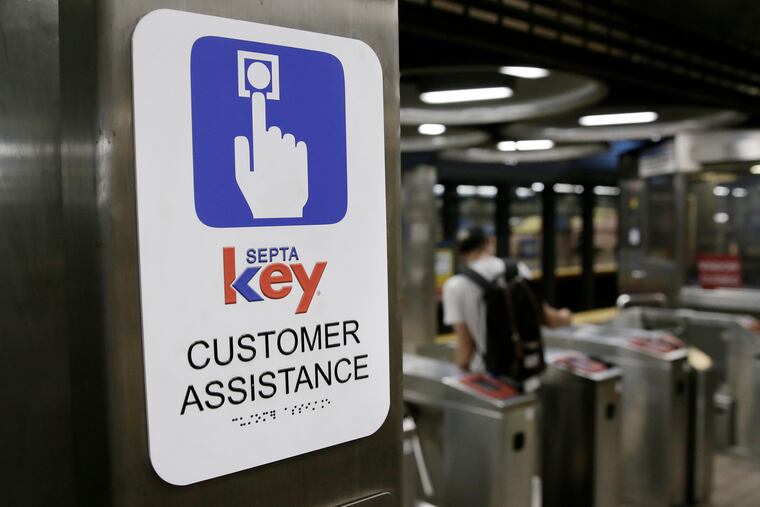10,000 SEPTA Key cards soon expire. Despite coronavirus, you’ll still have to get a new one in person.
Riders instead can get new Key cards at kiosks, SEPTA sales offices, and other retail locations.

Another expiration date for SEPTA Key cards will soon arrive just as the Philadelphia region enters a “yellow” reopening phase from the coronavirus pandemic.
Come June 30, 10,000 Key cards will no longer work, though about half “appear to be dormant” and may have been thrown away or lost, SEPTA spokesperson Andrew Busch said. Of the 5,000 active cards, almost 85% are registered, and holders have been notified that their cards will soon lapse, he said.
While those in the region can safely get groceries delivered to their doors and can vote by mail amid the COVID-19 crisis, don’t expect replacement cards to show up alongside bills and the latest credit card offering in the mail.
Riders can get new Key cards at kiosks, SEPTA sales offices, and other retail locations — some of which are temporarily shuttered because of the coronavirus. A map of where to buy cards can be found on the SEPTA Key website. Cards expire every three years under an arrangement with MasterCard. Expirations are an industry standard for fare cards like the Key, SEPTA has said.
Those who need to transfer balances can do so online and on the SEPTA app by calling the SEPTA Key Call Center at 855-567-3782, or at the authority’s sales offices.
A SEPTA account that held more than $200,000 in unclaimed money from expired Key cards last year has dropped to about $184,000 as riders redeem the funds, Busch said.
Riders can get a new Key card without undue risk, said Henry Fraimow, infectious disease specialist at Cooper University Health Care.
“As long as they’re doing what we all should be doing, which is wearing masks when we go out and appropriately social distancing … then that shouldn’t be a huge risk,” he said. “That’s probably less risk than going into a supermarket, having to deal with all of what goes on inside of a supermarket.”
Restrictions that kept people in the region inside to stop the spread of the coronavirus are easing. Philadelphia and its surrounding counties move to “yellow” reopening status on Friday, meaning that retailers, day care centers, and offices can open their doors for the first time in months. Large gatherings are still a no-no.
» READ MORE: What’s allowed to be open in Pennsylvania during red, yellow and green phases?
The latest wave of expirations comes on the eve of fare changes at the authority. Pending board approval this month, SEPTA plans to move forward on free transfers and reduced child fares on July 1 and postpone increases until next year. The effort intends to bring relief through the pandemic.
SEPTA doesn’t anticipate any hiccups.
“The July Key card expiration level is small in scale, and we don’t expect the fare change action to impact the user experience,” Busch said in a statement. “Most Key Travel Wallet customers will see a fare decrease, and SEPTA hopes this will create an incentive for expanded use of the system by existing customers, and help attract new riders.”
While most transit service has resumed, Regional Rail is still operating on a reduced schedule. The SEPTA Key’s rollout onto Regional Rail is expected this summer, with the transition continuing through the fall, Busch said.
Last month, SEPTA’s board approved a $963,000, six-month contract extension with LTK Engineering Services Inc., consultant on the SEPTA Key project. The initial $9.2 million contract has been extended nine times, bringing its total price to $19.2 million.
Next year, thousands of Key card validators are expected to be replaced to make way for mobile bar-code ticketing, contactless cards, and mobile payments, Busch said.